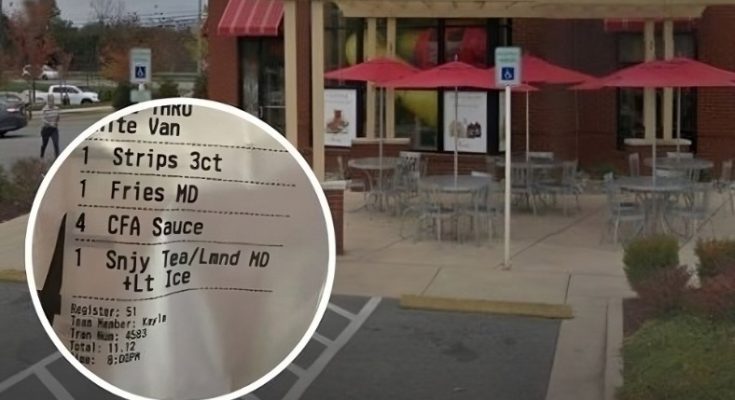Details of the Incident: What Happened at Chick-fil-A?
On August 23, 52-year-old Marquise Vanzego walked into a LaPlata Chick-fil-A to place an order in person. He made sure to clearly provide his name to the employee. However, while waiting for his meal, he was shocked to hear an employee call out “Monkeys.” Initially thinking it was a mistake, Vanzego’s confusion quickly turned into hurt when the worker confirmed the order belonged to “the man in the white van”—matching Vanzego’s description.
Upon examining his order receipt, Vanzego saw the racial slur used as the “guest name.” Outraged, he immediately approached the manager to demand answers, questioning if this was part of a larger pattern of racial profiling. The encounter left him deeply disturbed.
Vanzego’s Response: Outrage and Disbelief
Vanzego described the experience as humiliating. In a statement to TODAY, he said, “It felt like a sting in my heart.” He shared that the incident brought back painful memories of other racial incidents he had encountered or heard about in the news. He took to Instagram, calling the experience “not only offensive but also deeply humiliating.”
In a video he shared on Instagram, Vanzego can be seen speaking with the manager, explaining that he had provided his real name, “Marquise,” making the racial slur even more inexplicable. His frustration was evident as he questioned how such a blatant misinterpretation could happen.
Chick-fil-A’s Apology and Response
Chick-fil-A’s corporate office responded to the incident, describing it as “unacceptable” and acknowledging that it fell short of the company’s standards. However, they clarified that this particular Chick-fil-A is independently owned, meaning the franchise owner was responsible for addressing the issue.
According to the owner, the employee involved was a 17-year-old white male who claimed he misheard the name as “Monkey.” When Vanzego challenged this explanation, he asked the owner if he had ever encountered someone named “Monkey,” underscoring the absurdity and offensiveness of the incident. Despite the gravity of the situation, the franchise owner informed Vanzego that the employee would not be fired.
Vanzego’s Call for Accountability
While Vanzego acknowledged that the employee was young, he emphasized the need for accountability. “I understand he’s a young man, but he also needs to understand that actions have consequences,” Vanzego said. He wanted the employee to not just face consequences but also learn from the incident and understand its impact.
Frustrated, Vanzego attempted to address the situation directly with the employee, but the manager denied him this opportunity, further escalating his frustration. He expressed concern over the lack of awareness and the failure to address the incident adequately, emphasizing the need for more proactive measures to prevent similar occurrences.
Public Reaction: Divided Views on Social Media
As news of Vanzego’s experience spread on social media, reactions were mixed. Many people expressed support for Vanzego, condemning the incident as unacceptable and highlighting a lack of racial sensitivity. Comments such as, “This is why proper training is crucial in customer service,” and “No one should be subjected to such disrespect” were common among those who supported Vanzego.
However, some users viewed the incident as a miscommunication rather than an act of racism, suggesting that the 17-year-old employee might have genuinely misheard the name. Others countered this perspective, noting that “Monkey” is a well-known racial slur that cannot be dismissed as an innocent error.
Broader Implications: Why This Incident Matters
This incident highlights the persistent challenges Black Americans face, even in everyday situations like picking up a meal. It raises concerns about how businesses handle complaints related to racial insensitivity. While Chick-fil-A’s apology is a step in the right direction, it also brings up questions about the accountability standards between independent franchisees and corporate-owned locations.
The event emphasizes the need for better training in customer service, particularly in fostering an inclusive and respectful environment for all customers. Employees must understand the impact of their words and actions to avoid incidents like this.
Conclusion: The Urgent Need for Racial Sensitivity
The incident involving Marquise Vanzego at Chick-fil-A is a stark reminder of the racial sensitivity issues that persist in customer service. While some people may see this as a misunderstanding, the hurt caused by the use of a racial slur is significant. Vanzego’s experience underscores the importance of training employees, enforcing accountability, and ensuring that customers are treated with respect and dignity.
As conversations about racial awareness continue, this incident serves as both a warning and a call to action for businesses to establish a respectful and inclusive culture. Addressing such incidents with seriousness and empathy is essential—not just for good business, but for upholding basic human decency.



